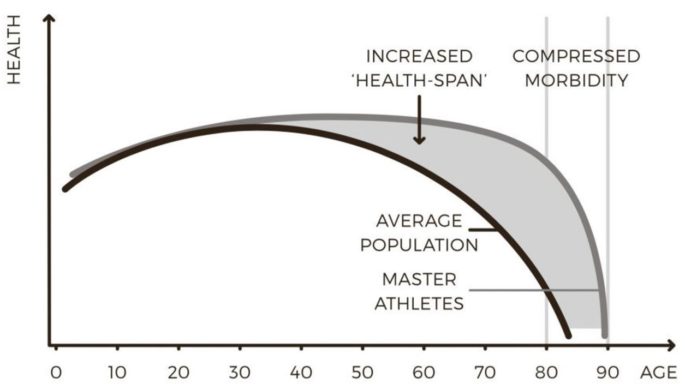Tip #14: Can you still compete at age 40, 50, 60+?
Obesity levels for the senior population in the U.S. are now over 40 percent. If you are a former high school/college/post-college athlete who has been on the couch for the past 20-30+ years, this series of twice-monthly tips will show you how to resume an active lifestyle.
Fortunately, numerous studies have confirmed that it is never too late to resume an active lifestyle. I will show you how to reduce your fitness age, a more reliable indicator of longevity than your BMI, by 20+ years over the next 12-24 months. You will definitely be healthier, happier, and an inspiration for your family, friends, and colleagues. What’s better than that?
Can you still compete at age 40, 50, 60+?
- Your sports goals.
- Your current level of fitness.
- Your current gear (and budget).
- Your available time to train daily, weekly, and yearly.
- Your lifestyle challenges and stressors.
If there are no barriers in your life to competing, it is never too late to start. According to an article titledBecome An Athlete in Your 40’s & 50’s – It’s Not Too Lateby Jonathan Cawte, “Peak performance does not decline in a linear fashion. It is gradual. Followed by a rapid drop off late in life.” He continues, “The research into the health of masters athletes reflects the aim that many of us gave: maximize the ‘healthspan’ by reaching a peak and then maintain our health, physical and cognitive capacities for as long as we can, compressing ill health into as short a period as possible.”
According to Coach Chris Carmichael, who is a cyclist in his mid-50s and spends a lot of time riding with athletes up to 30 years younger and 25 years older than him, there are four principles to consider if you want to compete later in life:
- Your potential declines, but your ability to maximize your potential doesn’t. According to Carmichael, “Numerous studies show that an endurance athlete’s VO2max declines gradually, typically starting sometime in your 30s. For many athletes, this decline only starts to be noticeable in the late 40s or early 50s. What doesn’t seem to decline is your ability to operate at a high percentage of your maximum potential.”
- Wisdom cancels out some of the advantages of youth. According to Carmichael, “Older athletes tend to have the means and patience to eat fresher and more nutrient-dense foods. They’re more willing to go to bed earlier…are more comfortable with their career and family lives…know themselves better, have more confidence, and are often better at listening to the signals their bodies are sending them.”
- Don’t worry about what you can’t change. Says Carmichael, “There’s no fountain of youth, so I work hard to keep this old body as fit as I can. And I push myself to my limits in training and competition because I enjoy and crave the sensation of giving everything I have – even if what I have to give isn’t as much as it used to be…What you can control is what you do with the physical potential you have.”
- Training won’t kill you (probably). There have been a series of articles, mostly in mainstream running, triathlon, and cycling publications, that suggest athletes are at increased risk for heart problems. The general idea is that while some exercise is good, lifelong athletes have overdone it and are exercising themselves into an early grave. Carmichael disputes this. “There is not enough evidence, yet, to say there is a causal link between exercise and the development of arrhythmia in older athletes. You have a lifetime of experiences – positive and negative – and underlying genetic factors that come into play. If you have any signs or symptoms of arrhythmia (a racing heart, fluttering heartbeat or skipped beats) you should see your cardiologist. Don’t panic, though…experiencing an arrythmia isn’t a sure sign of a life-threatening or long-term problem…Athletes are also more attuned to their bodies and sometimes notice arrhythmias before a sedentary person would.”
- Make hay while the sun shines. At the 2019 National Senior Games, the number of participants ages 50+ increased by 14 percent from 12,000 in 2017 to 13,712 in 20 medal sports. There were even three men ages 90-94 and three women ages 85-89 in the cycling events.
What have I learned?
I’ve discussed the concept of “fitness age” in Tip #4 – What’s your current fitness age? What I didn’t mention was that the only medication I’m taking is an over-the-counter 81mg “baby” aspirin daily. That’s it, period. I’ve lived all my life with a debilitating form of arthritis without the need for any medication. I currently use nightly yoga exercises, as well as my regular training, to mitigate the effects of the disease.
As for my ability to compete over the past 20+ years, I’m a couple of miles-per-hour slower now, but I’m still competitive at the local, state, regional, and national levels with average speeds of 23+ mph and maximum speeds approaching 40 mph. Interestingly, while the number of my competitors has shrunk, the speed of my Masters age-group podium finishers still exceeds 25+ mph average.
Any questions?
Tip #15 Preview: If you want to compete, how fast do you have to go?
